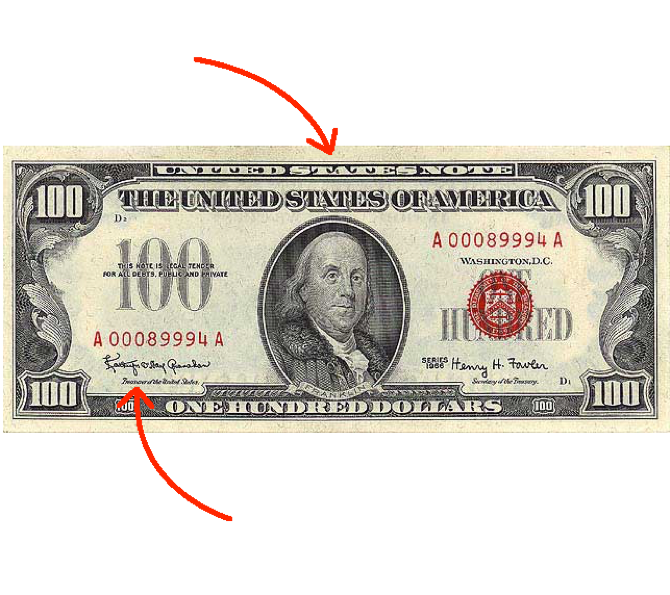Yves here. Rob Urie updates a tale foretold by Lenin, and Marx too: that capitalism leads to concentration and inequality. Financial capitalism and conquest (formal and by creating vassals) extend that process.
By Rob Urie, author of Zen Economics, artist, and musician who publishes The Journal of Belligerent Pontification on Substack
The growing sense that ‘the world’ is falling apart is more precisely the US working through the contortions and dislocations of late-stage capitalism. Following four plus decades of increasingly shrill exhortations that ‘markets’ were the base institution of capitalism, the Wall Street bailouts of 2008 – 2009 demonstrated that the Federal government of the US is the sponsor of much of the finance capitalism that now encircles the globe. The motive for this presence: to consolidate US power in the world. Anyone who imagines that doing so isn’t ‘political’ should study the history of IMF (International Monetary Fund) workouts.
Within the capitalist purview, finance is politically neutral, one possible path for economic development. Laid out in graphs below is that the growth of private debt (to GDP) has taken place at a particular point in capitalist development, one far away from the industrial roots of capitalist production. A stylized fact pertaining to this stage is economic concentration, with power ever more narrowly distributed ‘inside’ of capitalist economies. As income and wealth have concentrated, so has economic production. The US is now decades into the current epoch of monopoly capitalism.
The purpose of this essay is to develop social explanations of events as they unfold. If retired US military officers are correct (see here, here, here), the US lacks the munitions to win even one of the wars that it is currently engaged in. Moreover, its position resembles that of the Biden administration, where the current path is visible, but not articulated. The American strategy has been an ad hoc assemblage of explicit and stealth financing of arms sales from the American MIC to belligerents carefully assembled by the US to serve its imperial goals.
Graph: while the Western evolution from industrial to financial capitalism is a mystery to capitalist economists, both Marx and Lenin not only predicted it, but explained the economic rationale for it. While public debt can be paid through sovereign money creation, individuals and corporations lack the legal authority to do so. And while much of this private debt (to GDP) consists of mortgages, asset seizure is the legal ‘right’ of most loans when debts go unpaid. This gives financial institutions great leverage over the lives of debtors. Additionally, financial institutions shift from being passive lenders to financial gamesmanship to consolidate their own power as these epochs unfold. Source: IMF.
To prevail militarily would mean rebuilding the industrial infrastructure that DC insiders have spent the last forty years jettisoning. The $60 billion that the Biden administration has been desperate to secure for Ukraine is more precisely to keep NATO’s loss to Russia from voters until after the 2024 election. Related, the 51-billion-euro war funding recently approved by the EU is a placeholder to keep the American, German, and French munitions manufacturers flush with cash to facilitate a permanent war against Russia. What success would look like in this scenario is the further concentration of Western economic production in ‘American’ hands, meaning oligarchs and corporate executives.
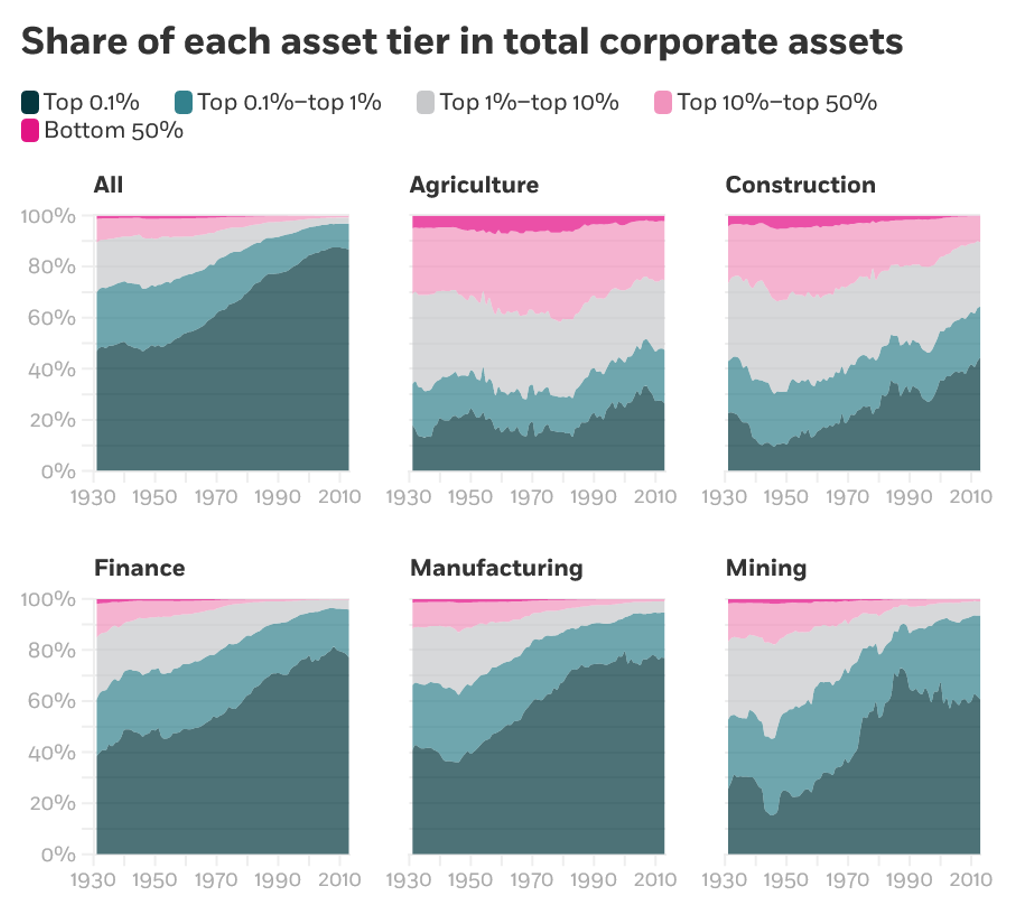
Graph: as predicted by Lenin, American capitalism has become highly concentrated over time. Large US corporations (dark green area) have become larger, and industries more concentrated, since the 1930s. This concentration means less competition from weaker players, leaving large corporations firmly in control of Western political economy. Note that monopoly and oligopoly capitalism, the result of this concentration, bear no relationship to the competitive firms that Western economists claim as the basis of ‘market’ economies. Source: Booth School University of Chicago.
The answer to the great mystery of why the US launches, or otherwise engages in, wildly murderous and destructive wars no matter who, or which duopoly party, is in power is: war is the business of America. Some economies produce mangoes and kittens and some produce wars. The (military) Keynesian project that followed WWII in the US was intended to be a broadly distributive jobs program for returning veterans. However, in thoroughly predictable fashion, capitalist consolidation and concentration dictated that these firms would be ‘rationalized,’ meaning the canard of capitalist ‘efficiency’ deployed, to convert broad economic distribution into highly concentrated distribution.
In capitalist economics, monopoly is the rare instance where power is naturally concentrated (e.g. laid phone lines), and thus a role for government ‘interference’ in markets is warranted, if only rarely deployed. In contrast, Lenin perceived capitalism in terms of historical development, and not through ‘comparative statics’ based in Cartesian time. Thus, the great mystery of oligarchs and corporate executives substantially controlling Western political economy is framed as a problem of ‘money in politics.’ However, the movement of this consolidation from a weak state to a strong state has been a function of historical development, and not a static input that yields equivalent results irrespective of its place in history.
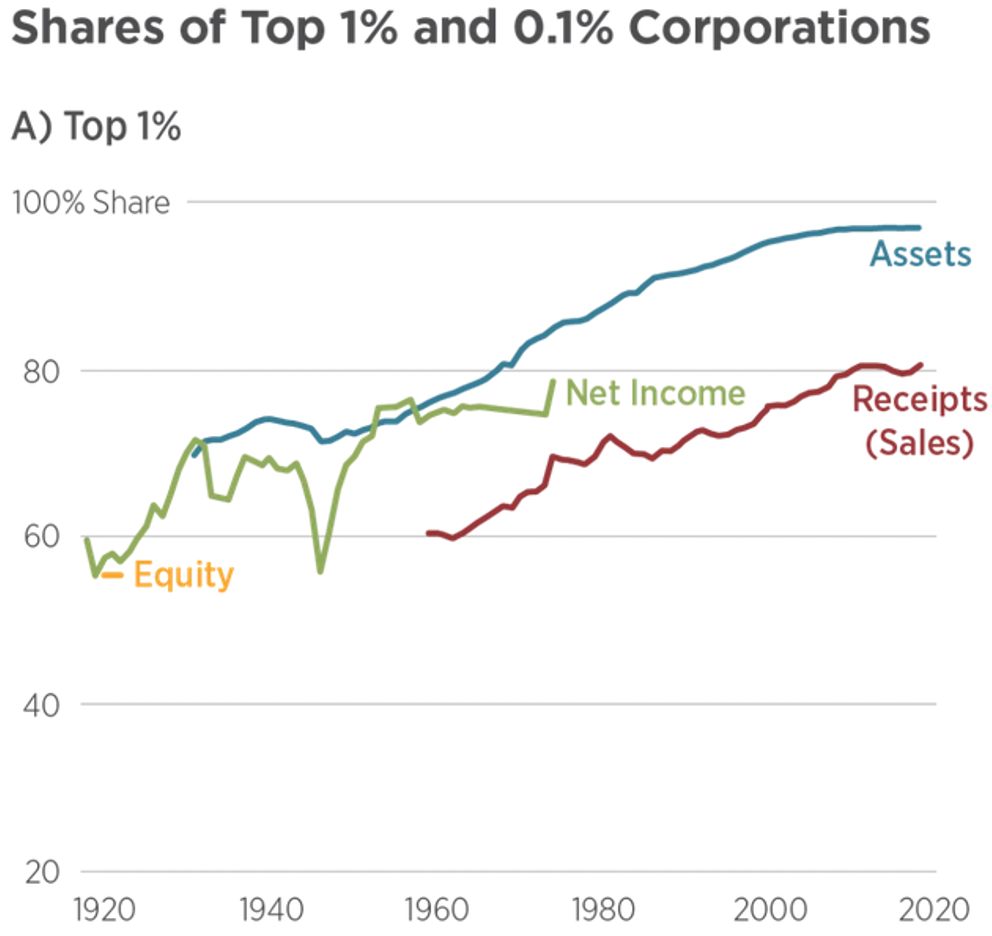
Graph: restating the data in the top chart, it becomes obvious that 1) industry concentration has been rising in the US for the last century and 2) monopoly and oligopoly power now form the core of US capitalism. Using an intuitive example with the ACA (Obamacare), atomized individuals choose amongst products created by monopoly and oligopoly producers. In other words, ‘market signals’ only travel in one direction— downward. Further, the quantity and quality of the product delivered in exchange is determined only after the transaction has been completed. Such an economy only works in the presence of the capacity of individuals to negotiate as equals. The ACA is structured to assure that such a balance-of-power never arises. Source: University of Chicago.
This tendency towards consolidation increasingly makes large, concentrated, enterprises the enemy of small business, the alleged ‘lifeblood’ of Western capitalism. The ‘Golden Rule’ of capitalism, that s/he who owns the gold, rules, implicitly recognizes both the concentrated power that exists within capitalism, and its value as ‘political’ capital. Via the neoliberal ethos, politicians are self-interested economic actors. Their theater of operation is government ‘management’ of capital, e.g. the 2008 – 2009 Wall Street bailouts. Politicians see the vast fortunes that they provide ‘their’ donors with, and act to put as much of that as they can into their own pockets.
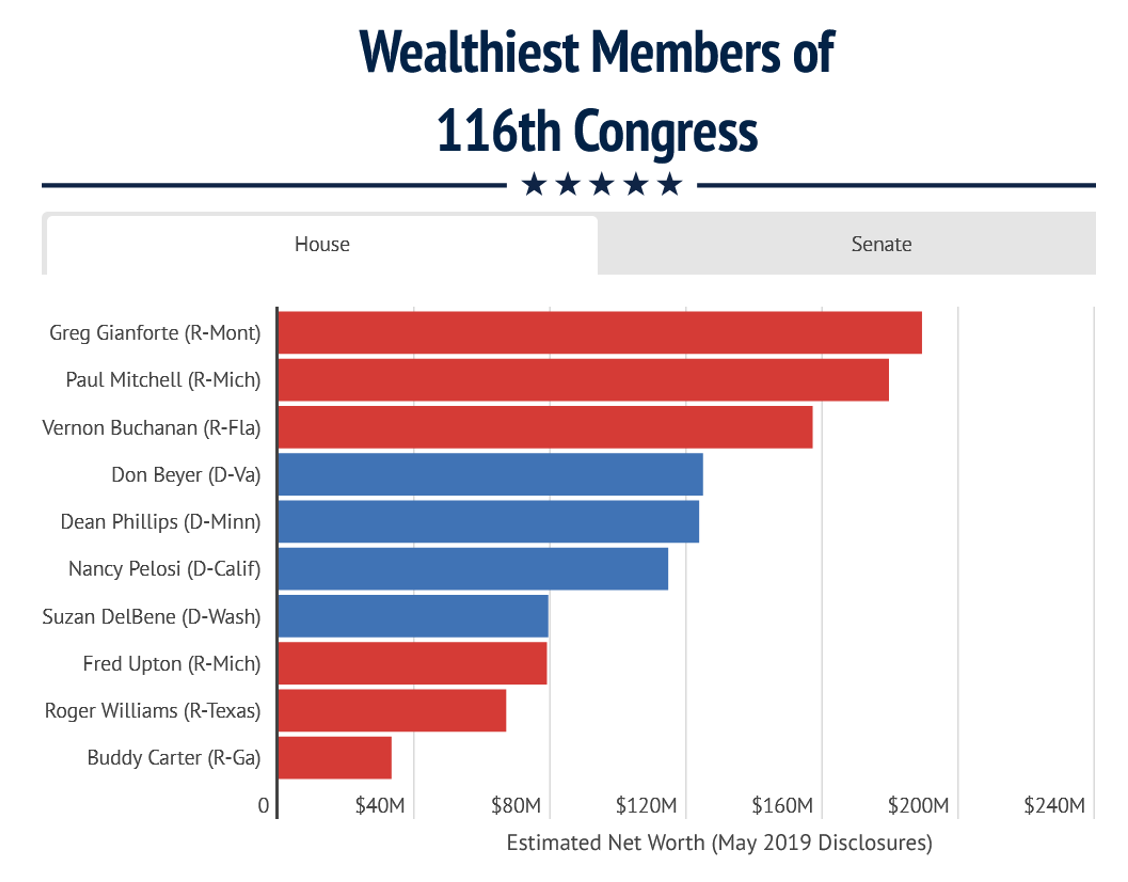
Chart: in the 1960s, Washington, DC was one of the poorest cities in the US. Seventy years, and one neoliberal coup, later DC and environs are a playground for the rich. Moreover, ‘public service’ has become code for creating self-enriching programs nominally in the public interest, as well as the revolving door between government and business. Of note is that Democrats have been openly feeding at this trough right next to Republicans. While median wealth in the US in 2022 was $192,900, former House Speaker Nancy Pelosi has squirreled away $110,000,000 through insider trading and shaking down campaign contributors. Source: opensecrets.org.
Any history of the US relationship with Russia that looks back farther than February 24, 2022, the start of Russia’s SMO (Special Military Operation), finds three decades of the Russians politely asking the US not to surround it with NATO forces as the US continued to do so. Likewise, the US-sponsored genocide currently unfolding in Gaza begs the question of where the Palestinians who are being exiled will go? Doesn’t the US support landless people who are being exterminated by a ruthless tyrant? (No). In fact, Israel is doing the bidding of the Biden administration in Gaza as DC insiders are still ranting about the Iranian Revolution (1979). Again, history, rather than theory, has bearing.
Additionally, the question of why the US has historically acted to crush budding democracies is answered with: American capitalists 1) need customers and 2) don’t want competitors. Consider: the historical trajectory of the last century of capitalism has been toward the consolidation and concentration of economic production in fewer and fewer hands. Capitalists could have been ‘kind’ and saved their American competitors from ruin, but profit maximization / rent extraction led them to conclude otherwise. Why would national competitors look any more kindly upon international competitors? They wouldn’t. Hence concentration is both ‘internal’ and ‘external’ to national economies.
The American refusal to simply exist amongst other nations in a multipolar world, but instead needing to dominate them, finds analog in this consolidation and concentration of American industry (graphs above). In key sectors, industry concentration creates economies of scale and market power that in turn produce high barriers to entry for competitors. The phrase ‘go big or go home’ captures the strategy while excluding its motivating logic. As this process has unfolded historically, ‘American’ industry has become increasingly concentrated, with very high (95%) concentration at present. This reframes ‘income inequality’ away from moral chide (‘greed’) to make it an effect of economic concentration
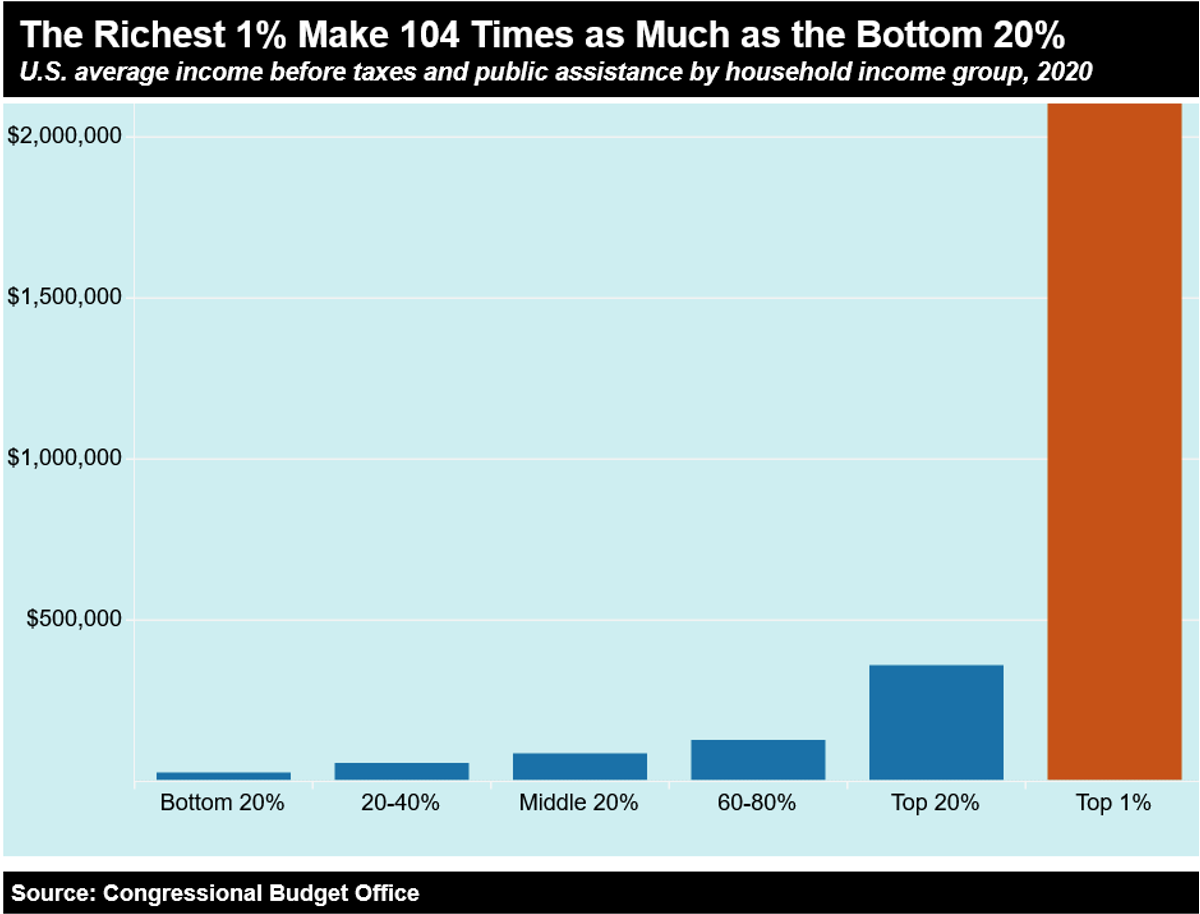
Graph: coincident with industrial concentration has been the concentration of incomes and wealth in fewer and fewer hands. Illustrated is that the poorer 80% of the US receives only a tiny fraction of the income earned by the rich. This distribution is likewise a function of historical development, and not ‘merit.’ The incomes and wealth that accrue to oligarchs and corporate executives are a function of market power, not equitable distribution. In this history, incomes and wealth have concentrated as market power has. ‘Merit’ is misdirection intended to explain away this power as a function of nature rather than the economic dysfunction of late-stage capitalism. Source: inequality.org.
The way that consolidation and concentration work is that economies of scale in some industries (e.g. manufacturing, finance) lead to price competition that is ruinous for smaller players who lack these economies. This leads to them either being bought out by their competitors, or they go out of business. And viola, consolidation and concentration are the result. To be clear, this is due to market structure in applicable industries, not to the moral failing of capitalists. In the US, institutional economists imagined that these efficiencies would be shared with ‘consumers.’ Why would they think this? Earning monopoly and oligopoly rents are the goal of concentration.
With the current ‘leadership’ of the US launching conflicts with Russia, Hamas (Israel), Lebanon, and Iran, one could be forgiven for imagining that it has the capability to prevail militarily. But again, according to retired military (links above), the US lacks the munitions and materiel to prevail against even one of these ‘enemies.’ By reports, Donald Trump had planned to launch a war against Iran until he was told by his military advisors that the US would quickly lose such a conflict. Should Biden attack Iran, it could well spell the end of the US. Once a tipping point is reached, the US should expect blowback for the last 150 years of imperial predation.
It was telling that Joe Biden, as he was flailing about for talking points to sell his war against Russia, started claiming an economic benefit from the US proxy war against Russia. George W. Bush, Biden’s spirit-guide, also claimed an economic benefit after no WMDs were found in Iraq during his disastrous war there. In economic terms, both were repeating the ‘broken windows fallacy,’ the notion that economic destruction that will be replaced provides an economic benefit. While this may be true of GDP calculations that don’t net economic losses from new spending, it is utterly grotesque in human terms as a theory of how the world ‘works.’
The fallacy is the claim that ‘the economy’ benefits when a window is broken because it will be replaced. GDP rises when the replacement glass is produced, ergo there is an economic benefit to breaking windows. Of course, what wasn’t done here was to deduct the value of the window that was broken from the revenue received for the new glass. Note: the act of paying for the new glass implies that the old glass had economic value before it was broken, else why replace it? It provided the same ‘utility’ as the new glass. In human time / space, wars always and everywhere cost more than they produce in terms of economic benefit.
What Biden doesn’t address with respect to the windows he is breaking is the resulting distribution of payments and costs. The MIC gets rich from war production The rest of us, not so much. So, there is one group, the MIC, that loves war because it gets rich from it. But the rest of humanity is rendered dead, disabled and / or destroyed by it. With the broken windows fallacy, Biden is telling the MIC that it will benefit from the destruction of Ukraine and Gaza. But as far as the net benefit to humanity from war goes, it has a giant minus sign in front of it. So, Biden is making the imperialist argument from the perspective of those in the US for whom death and destruction are a business.
What Western economists choose not to address with respect to capitalism is economic distribution. Via ongoing concentration across and within industries, industrial concentration is a partial explanation for the recent re-concentration of incomes and wealth. The HBO series Succession features a wealthy family that spends its days replicating the court intrigue of yesteryear as it produces nothing of social value. That they are rich is a function of financial gamesmanship rather than besting their competitors in the production of goods and services. ‘Merit’ in this case is skill at financial manipulation and court intrigue, rather than making better goods at a lower price.
Liberals, the American left, and yours truly, perceive current US actions with respect to the Israelis in Gaza to be ‘fascist,’ in the sense of committing a racist genocide against the Palestinians. However, the Israelis plan an economic benefit from exiling Palestinians from Israel. They want the land for additional Israeli settlements, and possibly oil and gas extraction from the sea just off the coast of Gaza. The Americans want business for the MIC, a place to land and refuel fighter jets, control of the wider Middle East, and continued American domination of the world.
Looking back, the Americans managed to sell WWII as a moral battle of good Americans defeating evil Nazis. In fact, it was the Soviets, now ‘Russians,’ who defeated the Nazis. And the Americans are invited to explain how some imperial powers are good and others evil when they are all imperialistic? It was all the way back in the 1930s when former US General Smedley Butler proclaimed the role of the US military to be as a ‘gangster for capitalism.’ The US military exists to make the world safe for the few industrialists, financiers, and resource extractors who now constitute the American ruling class.
That the political establishment in the US appears comfortable with Biden’s provocations with respect to Russia and Israel has a lot to do with it being the beneficiary. In 1968, Washington, DC was one of the poorest cities in the US. In 2024, DC and environs are the richest. Now recall the graphs above that illustrate the historical process of industry and wealth concentration in the US. In 1968, industry concentration was lower, and so were house prices in DC. In 2024, industry concentration is higher, as are the concentrations of income and wealth. Lenin might have it that neoliberalism represented the evolution from industrial to finance capitalism.
In the American / capitalist frame, this evolution reflects the aggregated personal choices of three-hundred and thirty-million Americans, and was therefore impossible to predict. But both Marx and Lenin predicted it just fine. Through its internal dynamics, capitalist competition leads to consolidation, and with it, concentration. The abandonment of populist / progressive anti-trust enforcement is likewise treated as a mystery. However, as consolidation proceeds, power accrues to the remaining industrialists. Once finance enters the mix, the process of consolidation moves into warp speed. A central fact of the last four decades has been pirate capitalism, the monetization of pieces of companies as assets are being stripped.
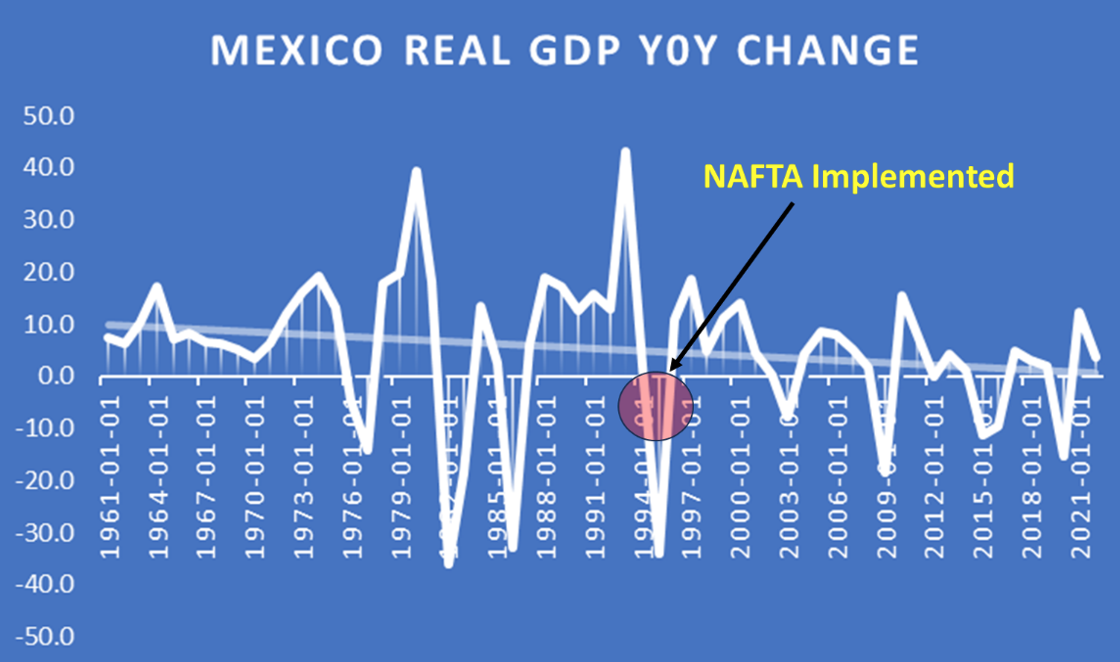
Graph: NAFTA was claimed to bring Mexico into the top tier of capitalist countries. But the reality is quite different. From the day that NAFTA was implemented, the rate of growth of Mexican GDP began to decline. This, as FDI (foreign direct investment) rose and millions of Mexicans saw their livelihoods destroyed, leading to their abandonment of traditional ways of living. Those angered by Donald Trump’s xenophobia need to take a hard look in the mirror. Bill Clinton’s policies (e.g. NAFTA) produced the economic refugees from Mexico that Trump was able to exploit politically. Source: St. Louis Federal Reserve.
With Mexico’s experience with NAFTA as a close and intuitive example, after it was passed, American agricultural products were dumped in Mexico, thereby driving prices below the costs of production for the indigenous peasants of Mexico. The livelihoods of millions of peasants were destroyed, ‘freeing’ them to go to work in the maquiladoras that line the US-Mexico border for dollars a day, or to flee north to the US in search of a wage. People who had been self-sufficient were made dependent on food imports, and to work in the cash-economy controlled by multinational corporations.
In either nominal or inflation adjusted terms, US-based multinational corporations have profited handsomely from NAFTA, while those who were told they would benefit have had their lives destroyed by it (see here, here, here, here).
“As for Mexico’s interest in this bilateral relationship, it can be summarized in two facts: about 80% of Mexico’s exports go to the U.S., while 50% of the accumulated foreign direct investment received between 2000 and 2011 comes from the U.S. Moreover, NAFTA has been the fundamental anchor for reforms that make Mexico a more modern economy and open society.” Mauro Guillen, UPENN.
The ‘reforms that make Mexico a more modern economy and open society’ is reference to the imagined ‘liberalizing effects’ of imperialism. With the history of NAFTA in hand, it was a neo-colonial pact whereby so-called ‘reforms’ in Mexico facilitated the extraction of wealth by connected Americans. The claim of benefits to Mexico and Mexicans doesn’t even work as an average, because the growth rate of Mexico’s GDP has fallen since NAFTA was implemented. Certainly, some Mexicans have benefited. They would be the colonial administrators for the Americans plus a few random capitalists. Consider, the same Joe Biden that supported NAFTA as he slandered the Mexican peasants who fled to the US as a consequence of it, is now ‘helping’ the Ukrainians.
While readers may quibble with some of the characterizations in this piece, the broad outline fits the facts of ‘our’ conundrum. As the most advanced capitalist economy in the world, the US is farthest down the path of its final stage. ‘The world’ has been here before— in the run-up to WWI. V.I. Lenin wrote ‘Imperialism: The Highest Stage of Capitalism, during this run-up. Had it not been for the New Deal, the fate of the US would have been left in the hands of capital. The only publicly acknowledged ‘fascist coup’ attempted in the US, the ‘Business Plot’ of 1933 revealed by General (Smedley) Butler, was carried out by Wall Street financiers
With no time to relearn old lessons, the American political leadership has gone completely off the rails by starting wars that it can’t win. Implied is a winner-take-all resolution whereby imagined competitors will be absorbed into the winner. This was the American plan for Russia before the Russians won the war in Ukraine. While you and I, dear readers, never voted for this program, the American ruling class did. And if you imagine this ruling class to be intelligent and world-wise, think again. While things fall apart for us, the stock market is at a record high.
Takeaways: over the last century, capital has consolidated in the manner, and to the extent, predicted by both Marx and Lenin. The motivation for this consolidation is intrinsic to capitalism. It therefore doesn’t comport with the liberal / American left concern with class struggle around the residual of industrial capitalism. Finance capital, the fluid of late-stage capitalism, differs fundamentally from its industrial forebear via its place in the evolutionary process of capitalism. Attacking the old form distracts from effectively addressing its evolutionary product.


